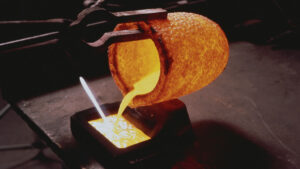In the wake of the Great Lithium Collapse, the multi-billion dollar question is how many of the dozens of projects in development will come to fruition?
At the current lithium price it looks like few of them will progress – even with some promising moves this week – but the quoted lithium prices can be deceptive.
As with the uranium market, trades are done mainly via opaque long-term contracts between the miners and the battery or EV makers.
Only about 5 per cent of lithium changes hands on the spot market, but this is the transparent price that moulds sentiment. The spot price peaked at about $US68,000 a tonne ($104,000/t) but now lingers around $US13,700/t.
The optimists’ view is that long term contract prices are much better, with Japanese and Korean buyers happily exporting at $US30,000 a tonne.
On the expectations of global lithium leader Albemarle, lithium demand will increase 28 per cent in calendar 2024, from one million tonnes to 1.3mt.
Demand then continues to rise to 2.3mt by 2027 and 3.3mt by 2030.
The supply side is harder to read, given the current mine curtailment and project cancellations.
Amid complex price dynamics, the owners of two brine-based projects are testing the waters for big-ticket funding. They argue their ventures have the benefit of being more environmentally friendly relative to hard rock mines – and cheaper.
Lake Resources (ASX:LKE) is seeking $1.5 billion to fund its flagship Kachi project, in Argentina’s ‘lithium triangle’ which accounts for 25 per cent of global supply.
Goldman Sachs has been commissioned to find funders for what’s likely to be a package involving debt, equity and offtakers.
“By early April we will have a good idea of where the partnering process is at,” says Lakes chief David Dickson.
At 10.6 million tonnes, Kachi is one of the biggest undeveloped projects. The lithium would be extracted via an ion-exchange technology to improve process efficiency and reduce the project’s environmental footprint.
Further afield, the Gina Rinehart-backed Vulcan Energy Resources (ASX:VUL) this week got encouraging news from the European Union’s European Investment Bank, which confirmed the company’s suitability for a loan of up to €500m ($830m).
The dosh would be for Vulcan’s €1.4 billion Zero Carbon Lithium brine extraction project in Germany’s Upper Rhine Valley, the world’s first integrated renewable energy and lithium project.
Vulcan is also seeking project debt and equity funding, with Export Finance Australia potentially contributing $200 million.
With an envisaged phase one output of 24,000 tonnes per annum, the project is backed by offtake deals with big-name European car makers.
Vulcan assumes that with a €23,865 ($39,600) long term price for lithium hydroxide, the project would generate annual earnings of €521m.
Lakes envisages an initial 25,000 tonnes per year operation generating $US635m annually based on a $US33,000/t ($50,000) price for lithium carbonate (which is slightly less valuable than lithium hydroxide).
Lakes is targeting production by the end of 2027, by which time a current global surplus of around 200,000 tonnes is forecast to morph into a deficit of the same order, growing to a one million tonne shortfall by 2040.
But the timing of a seemingly inevitable price recovery is the great unknown. Goldman Sachs commodity watchers are cautious, forecasting a flat price for the rest of 2024.
In the meantime, developers need to cut corporate costs and preserve cash because top-up raisings are almost impossible.
“We are very aware of the macro environment in which we live today,” says Lakes chief finance officer Don Miller.
Both Lakes and Vulcan holders have had a wild ride, with their shares trading at a fraction of their peak values but still well above pre 2021 lithium mania levels.
This story does not constitute financial product advice. You should consider obtaining independent advice before making any financial decisions.
The views, information, or opinions expressed in the interviews in this article are solely those of the interviewees and do not represent the views of Stockhead. Stockhead does not provide, endorse or otherwise assume responsibility for any financial product advice contained in this article.
The post CRITERION: Hard rock is so passé; it’s brine’s time in the sun, lithium lovers appeared first on Stockhead.






















